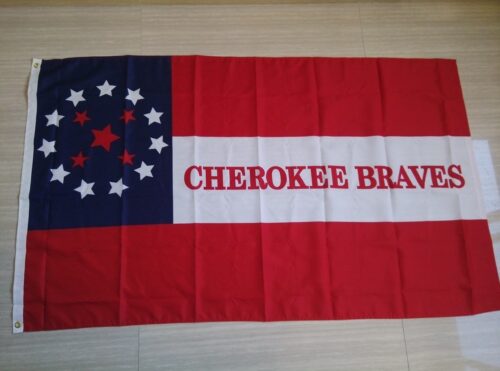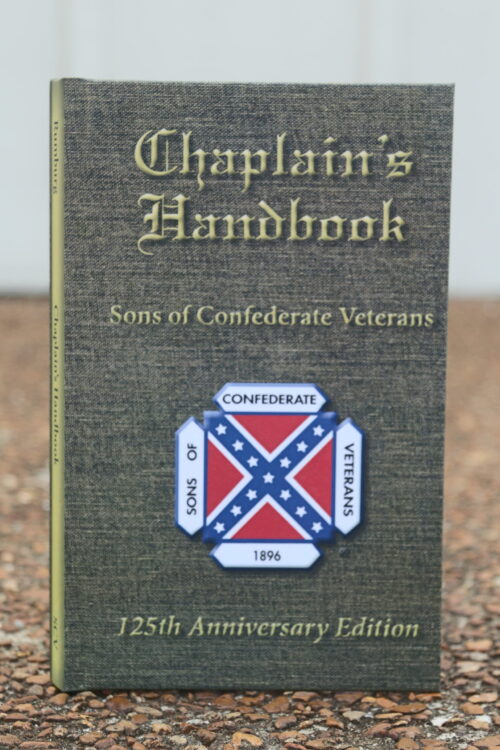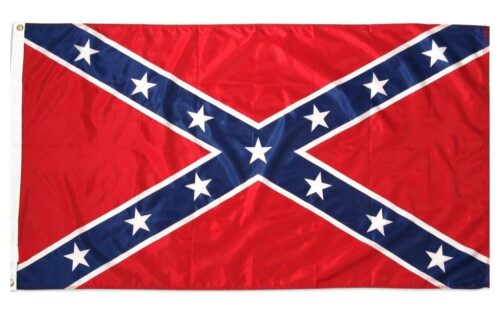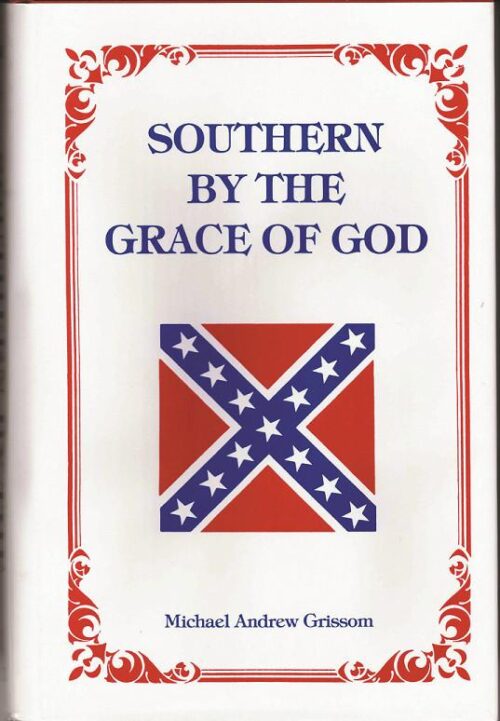-
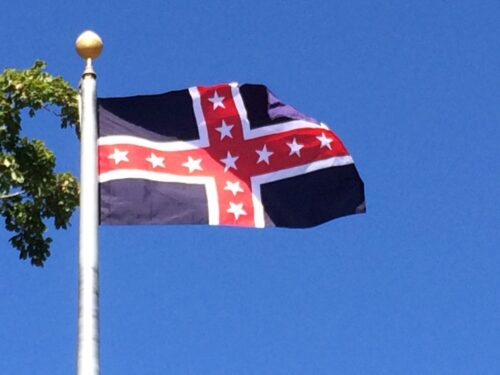 Polyester 3'X5'. General Leonidas Polk was the Episcopalian Bishop of Louisiana, a Confederate Lt. Gen. and Corps Commander in the Army of Tennessee. Killed during the Atlanta Campaign of 1864, the entire Army of Tennessee mourned his death. This distinctive design consisting of white and red Crosses of St. George on a royal blue flag was carried by the regiments in the Polk Corps.
Polyester 3'X5'. General Leonidas Polk was the Episcopalian Bishop of Louisiana, a Confederate Lt. Gen. and Corps Commander in the Army of Tennessee. Killed during the Atlanta Campaign of 1864, the entire Army of Tennessee mourned his death. This distinctive design consisting of white and red Crosses of St. George on a royal blue flag was carried by the regiments in the Polk Corps. -

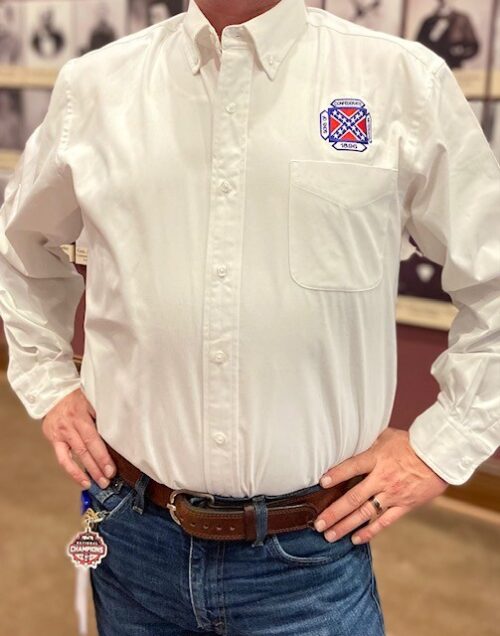 Excellent quality. 55% Cotton/45% Polyester long sleeve oxford shirts with Stain Release. Embroidered above the left pocket. Pearlized color-matching buttons. Extra stitching for strength at seams, armpit & buttons. Flat felled seam finishing. Full back yoke and back pleat. Port Authority brand. Dark Gray, White or Khaki.
Excellent quality. 55% Cotton/45% Polyester long sleeve oxford shirts with Stain Release. Embroidered above the left pocket. Pearlized color-matching buttons. Extra stitching for strength at seams, armpit & buttons. Flat felled seam finishing. Full back yoke and back pleat. Port Authority brand. Dark Gray, White or Khaki. -
Sale!
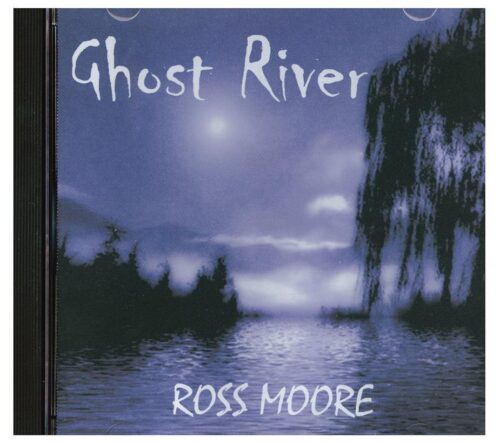 Another great music collection by Ross. Includes many traditional songs like "Down in the Valley", "Uncle Joe", "The Girl I Left Behind Me" and "Arkansas Traveler" along with many of Ross Moore originals that include "Prettiest Belle at the Ball", "Ghost River", "South Carolina Shuffle" and the beautiful "Sweet Magnolia Waltz" featuring Ross on the Celtic Harp. This CD is Dedicated to: The Gentlemen and Ladies who perpetuate and hold dear the social graces and values of the Old South.
Another great music collection by Ross. Includes many traditional songs like "Down in the Valley", "Uncle Joe", "The Girl I Left Behind Me" and "Arkansas Traveler" along with many of Ross Moore originals that include "Prettiest Belle at the Ball", "Ghost River", "South Carolina Shuffle" and the beautiful "Sweet Magnolia Waltz" featuring Ross on the Celtic Harp. This CD is Dedicated to: The Gentlemen and Ladies who perpetuate and hold dear the social graces and values of the Old South. -
Sale!
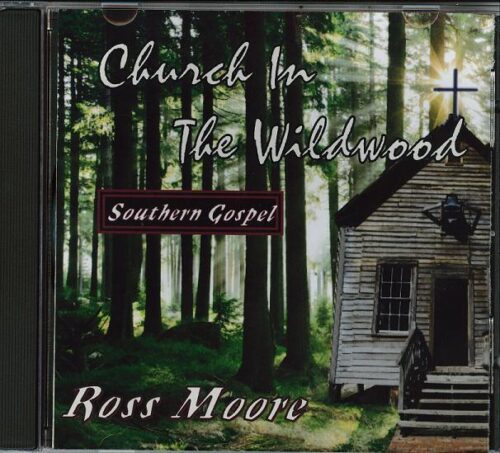 From the pages of a Southern Hymnal, Ross brings you the songs most of us remember from our childhood. Selections include: Church in the Wildwood, This Little Light of Mine, Amazing Grace, Will the Circle Be Unbroken, I'll Fly Away and 5 others.
From the pages of a Southern Hymnal, Ross brings you the songs most of us remember from our childhood. Selections include: Church in the Wildwood, This Little Light of Mine, Amazing Grace, Will the Circle Be Unbroken, I'll Fly Away and 5 others. -
Sale!
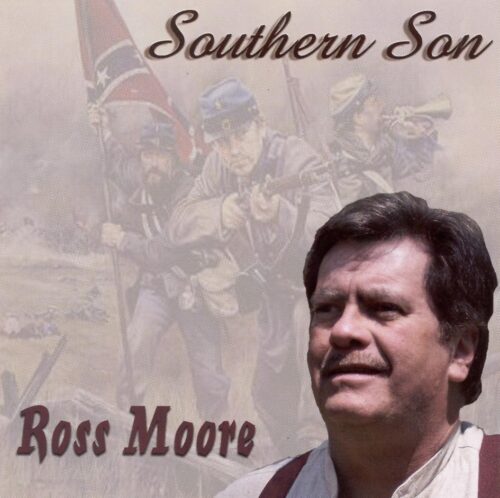 A collection of 15 songs about the CSA - featuring Ross’ twelve acoustic instruments and stirring vocals. Selections include ‘Young Rebel - The Story of Sam Davis'; ‘Last Day at Gettysburg’; ‘Southern Son’; ‘Aura Lee’ and ‘I Am Their Flag’ narrated by Dr. Michael Bradley.
A collection of 15 songs about the CSA - featuring Ross’ twelve acoustic instruments and stirring vocals. Selections include ‘Young Rebel - The Story of Sam Davis'; ‘Last Day at Gettysburg’; ‘Southern Son’; ‘Aura Lee’ and ‘I Am Their Flag’ narrated by Dr. Michael Bradley. -
Sale!
 Ross brings you the treasured acoustic sounds of a musical evening in the Appalachian hills. Includes: Wayfaring Stranger, Shenandoah Falls, Appalachian Round-up, Scarborough Fair and Meghan's Theme.
Ross brings you the treasured acoustic sounds of a musical evening in the Appalachian hills. Includes: Wayfaring Stranger, Shenandoah Falls, Appalachian Round-up, Scarborough Fair and Meghan's Theme. -
Sale!
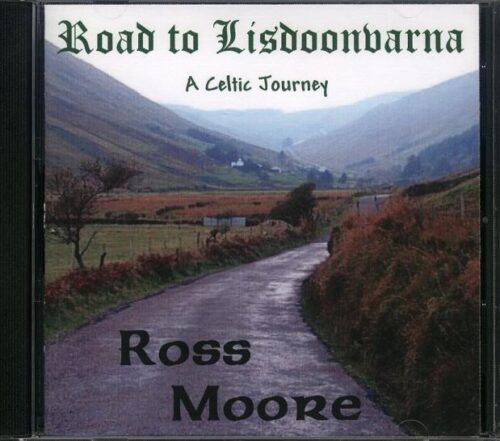 One of Ross Moore's latest offerings is a Celtic journey, with rich vocals and unforgettable melodies, including acoustic instruments such as the Celtic harp, pennywhistle, Irish concertina, hammered dulcimer, Uilleann pipes, bagpipes, banjo, mandolin, piano and both flat picked and finger style guitar.
One of Ross Moore's latest offerings is a Celtic journey, with rich vocals and unforgettable melodies, including acoustic instruments such as the Celtic harp, pennywhistle, Irish concertina, hammered dulcimer, Uilleann pipes, bagpipes, banjo, mandolin, piano and both flat picked and finger style guitar. -
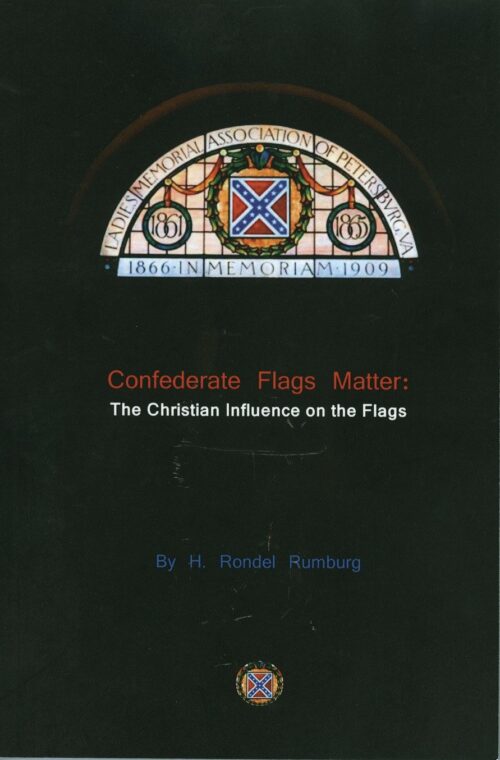 H. Rondel Rumburg, the author of many Confederate publications, brings this exciting new title to the front. It answers various questions: What is a flag? What is the use of a flag? What is the Christian symbolism of flags? What’s the Official origin of the Confederate flag? These questions as well as many others are answered in-depth herein. 13 historic poems are included, along with a Bibliography and Index.
H. Rondel Rumburg, the author of many Confederate publications, brings this exciting new title to the front. It answers various questions: What is a flag? What is the use of a flag? What is the Christian symbolism of flags? What’s the Official origin of the Confederate flag? These questions as well as many others are answered in-depth herein. 13 historic poems are included, along with a Bibliography and Index. -
 This is a collection of war letters written by teenagers George and Walter Battle during their service in Company F, 4th North Carolina Regiment, CSA. Underage, yet full of vitality and idealism, these boys were not just fighting for their country; they were fighting to protect their family's name. Two young brothers had gone off to war as mere boys. Their experiences quickly hardened and molded them into veterans of the greatest army ever to march on American soil.
This is a collection of war letters written by teenagers George and Walter Battle during their service in Company F, 4th North Carolina Regiment, CSA. Underage, yet full of vitality and idealism, these boys were not just fighting for their country; they were fighting to protect their family's name. Two young brothers had gone off to war as mere boys. Their experiences quickly hardened and molded them into veterans of the greatest army ever to march on American soil. -
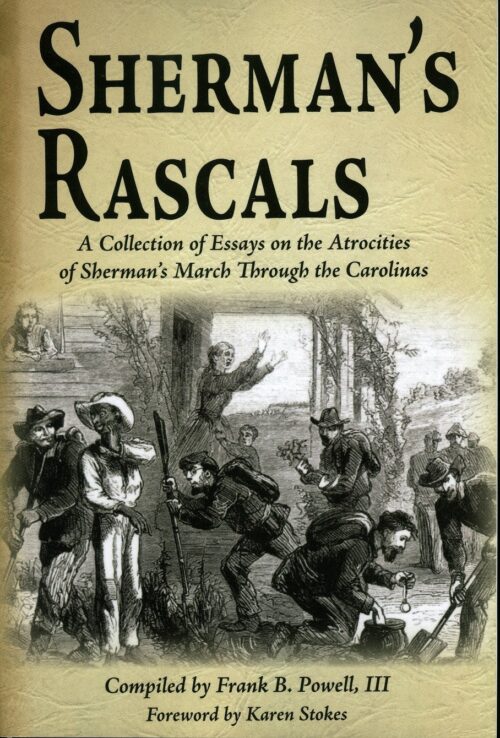 The ladies who wrote about their experiences wanted future generations to know about their trials and tribulations in the spring of 1865. Their stories have been almost forgotten, but they are printed in these pages for you to read and study, and to pass on to generations yet to come. For if one generation forgets, these stories will be lost for all eternity. Let’s not let this happen!
The ladies who wrote about their experiences wanted future generations to know about their trials and tribulations in the spring of 1865. Their stories have been almost forgotten, but they are printed in these pages for you to read and study, and to pass on to generations yet to come. For if one generation forgets, these stories will be lost for all eternity. Let’s not let this happen! -
 One of Savannah, Georgia's closest calls to total disaster happened with the arrival of Wm. T. Sherman and sixty-two thousand Union Troops. This fifty-three-day heart-pounding, nail-biting, hair-raising horror story of her onion-skin-thin bare survival centers on the central question: who REALLY saved Savannah?
One of Savannah, Georgia's closest calls to total disaster happened with the arrival of Wm. T. Sherman and sixty-two thousand Union Troops. This fifty-three-day heart-pounding, nail-biting, hair-raising horror story of her onion-skin-thin bare survival centers on the central question: who REALLY saved Savannah? -
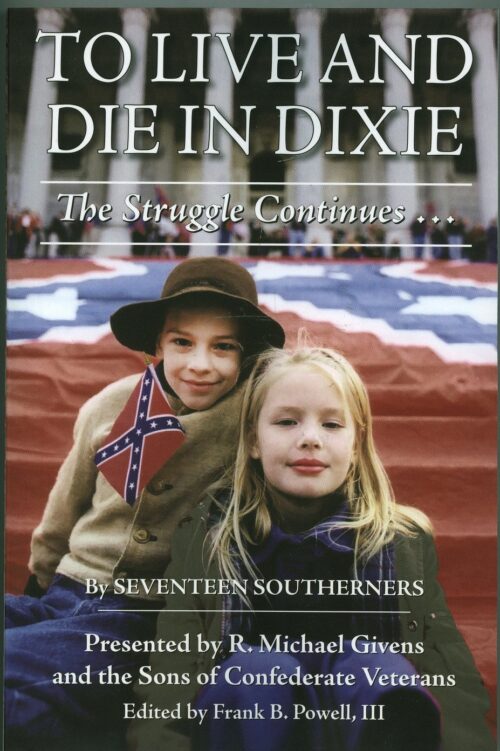 Companion book to the book "I'll Take My Stand: The South and the Agrarian Tradition" first published in 1930. In “To Live and Die in Dixie” you will find 27 essays which are designed to supply the weapons needed to take on the intellectually challenged and misinformed purveyors of modern historical imbecility. Intelligence is a weapon of self-defense. If you don’t know your own history then you will be helpless and ignorant before someone who merely claims to know your history! Originally published in the Confederate Veteran magazine from September/October 2010 through November/December 2014.
Companion book to the book "I'll Take My Stand: The South and the Agrarian Tradition" first published in 1930. In “To Live and Die in Dixie” you will find 27 essays which are designed to supply the weapons needed to take on the intellectually challenged and misinformed purveyors of modern historical imbecility. Intelligence is a weapon of self-defense. If you don’t know your own history then you will be helpless and ignorant before someone who merely claims to know your history! Originally published in the Confederate Veteran magazine from September/October 2010 through November/December 2014. -
 Marse Bradford Harrison, of St. Michaels, MD, gave 4 year old Eliza Ann Benson to his new born daughter, Braddie, in 1841. Eliza would be a slave to her infant owner in Harrison’s way of thinking. But a friendship began & a promise was made. Eliza stayed with Braddie through Braddie’s married life, which included the War Between the States & its aftermath; and when Braddie & her husband died leaving a family full of children & no one to rear them, there was one more promise that Eliza wanted to keep. Eliza’s down-home philosophy, loyalty, fortitude and love positively impacted Miss Braddie & 3 generations thereafter.
Marse Bradford Harrison, of St. Michaels, MD, gave 4 year old Eliza Ann Benson to his new born daughter, Braddie, in 1841. Eliza would be a slave to her infant owner in Harrison’s way of thinking. But a friendship began & a promise was made. Eliza stayed with Braddie through Braddie’s married life, which included the War Between the States & its aftermath; and when Braddie & her husband died leaving a family full of children & no one to rear them, there was one more promise that Eliza wanted to keep. Eliza’s down-home philosophy, loyalty, fortitude and love positively impacted Miss Braddie & 3 generations thereafter. -
 H. W. Johnstone explains how Lincoln and his co-conspirators used deceit, half-truths, lies and violation of international law to promote their war conspiracy. Johnstone wrote his book in 1917 using documentation which was not available when post war Confederates such as Davis, Stephens, Semmes and Pollard wrote their histories of the conflict.
H. W. Johnstone explains how Lincoln and his co-conspirators used deceit, half-truths, lies and violation of international law to promote their war conspiracy. Johnstone wrote his book in 1917 using documentation which was not available when post war Confederates such as Davis, Stephens, Semmes and Pollard wrote their histories of the conflict. -
 In 1865, Karl Marx praised Lincoln as a “single-minded son of the working class.” This book examines why Marx—and other socialists—supported Mr. Lincoln’s War and notes his negative influence on modern society. Firsthand accounts and insight from notable historians shatter contemporary views of both the sixteenth president and the early Republicans.
In 1865, Karl Marx praised Lincoln as a “single-minded son of the working class.” This book examines why Marx—and other socialists—supported Mr. Lincoln’s War and notes his negative influence on modern society. Firsthand accounts and insight from notable historians shatter contemporary views of both the sixteenth president and the early Republicans.

